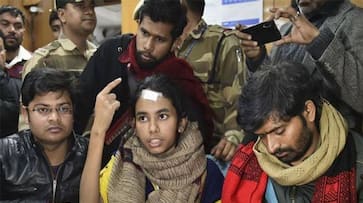Days after the masked mob attacked the students of JNU, the Delhi high court has asked the police officials to seize mobile phones of the members of the two WhatsApp groups that allegedly used to coordinate the attack on JNU students
New Delhi: The Delhi high court on Tuesday (January 14) asked the police to seize mobile phones of the members of two WhatsApp groups allegedly used to coordinate the attack on JNU students and faculty earlier this month.
Justice Brijesh Sethi directed the university to provide CCTV footage, sought by police, as soon as possible. The court also directed WhatsApp and Google to preserve and provide the information sought by police concerning the law on a plea seeking to preserve and retrieve all relevant materials and evidence available related to the violence in the campus on January 5.
The police have been directed to summon individuals who are a part of either one or both groups -- 'Friends of RSS' and 'Unity against Left' -- and confiscate their phones in connection with the matter.
Meanwhile, counsel for the Delhi Police told the court, "We have initiated the process. We have identified 37 people of the WhatsApp groups. Some are absconding, but we will call all of them."
Three professors of JNU -- Ameet Parameswaran, Atul Sood and Shukla Vinayak Sawant -- had recently approached the Delhi high court through a petition seeking to preserve CCTV footage, preservation of data of social media and other evidence related to January 5 violence at the university campus.
Senior advocates Rebecca John, Akhil Sibal, Maanav Kumar and Roshni Naamboodiry, appearing on behalf of the professors, had sought directions for preservation and retrieval of all materials and evidence available with WhatsApp, Google and Apple about relevant data of the two WhatsApp groups including messages, pictures and videos and phone numbers of the members, related to JNU violence.
During the hearing, counsel for Google argued that WhatsApp should share the email address. "If they do so we will preserve it," the counsel said.
Responding to the same, WhatsApp said, "We do not have access to the chat content. We will put it on the affidavit."
"It works on end to end encryption, and the only way to access and preserve it is by preserving the phone of those persons. I am willing to do what the law intends to do. No technology to break through that encryption," the counsel for WhatsApp further said.
Last Updated Jan 14, 2020, 3:20 PM IST









![Salman Khan sets stage on fire for Anant Ambani, Radhika Merchant pre-wedding festivities [WATCH] ATG](https://static-gi.asianetnews.com/images/01hr1hh8y86gvb4kbqgnyhc0w0/whatsapp-image-2024-03-03-at-12-24-37-pm_100x60xt.jpg)
![Pregnant Deepika Padukone dances with Ranveer Singh at Anant Ambani, Radhika Merchant pre-wedding bash [WATCH] ATG](https://static-gi.asianetnews.com/images/01hr1ffyd3nzqzgm6ba0k87vr8/whatsapp-image-2024-03-03-at-11-45-35-am_100x60xt.jpg)


